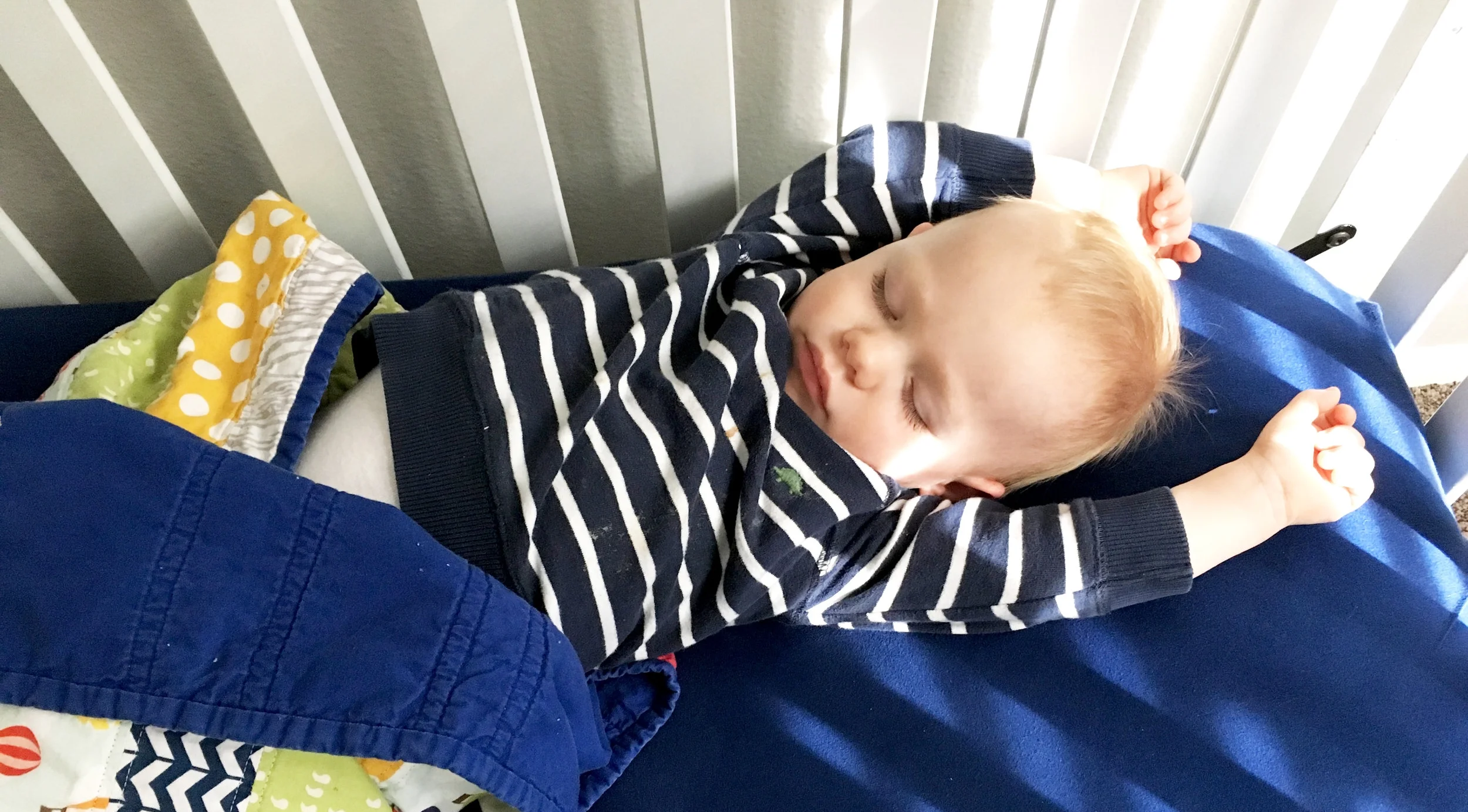As I've mentioned in previous posts (see here and here), my biggest sleep issue with my own daughter was naps. I don't know if I'm just horrible with Google searches, but I couldn't seem to find any answers about correctly timing the naps.
In this 3-part blog mini-series, I'll go over how to time naps according to different ages so that hopefully YOU don't have as much trouble figuring out naps!
You may have heard me say that there are different ways to do naps: waketimes and circadian rhythms (among other things). As I mentioned last week, I use waketimes for babies under 6 months. It's possible to continue using waketimes for babies all the way until they completely drop naps (around 4-5 years old); in fact, I used waketimes for my daughter from the time I sleep trained her with a consultant (6.5 months) until she was over a year old. Waketimes definitely work with older babies, but it involves daily math and there's a bit less predictability when it comes to what time those naps will start since each nap is dependent upon when the day started, as well as the naps that came before. That is why I prefer to use circadian rhythms for babies older than 6 months, and sometimes as early as 4 months!
Circadian Rhythms
We all have circadian rhythms that dictate when we should sleep to get the most restorative rest. If you've ever worked a graveyard shift and tried to take your 7-8 hours of sleep during the day, you may have found that you just never felt well-rested. Personally, I like waking up early (6am is good for me), so when my husband started a job that required him to wake up at 5am to make it on time, I decided I'd adopt his new schedule of sleeping from 9/9:30pm until 5am. What I discovered was that even though I was getting the same amount of sleep, I was not waking up well-rested. I was groggy and I had the same kind of headache I used to get when I pulled all-nighters in college! I found that my circadian rhythm for night sleep is 10pm-6am rather than 9pm-5am.
Babies also have circadian rhythms that dictate the best times for them to sleep, both for naps and nights. For most babies, those naptime circadian rhythms are at about 9am and 1pm, and bedtime in this age range can fall anywhere from 5pm-7:30pm (8pm at the latest). Some babies need to go down for their naps a little earlier than 9am and 1pm in order to catch the 9&1 sleep waves, while other babies do great going down at exactly 9&1.
Naps
On the front end of this age range, babies are still taking three naps daily. Their first two naps are around those 9am and 1pm marks, and then they take a third (usually short) nap around 4/4:30pm. Most babies drop that third nap sometime between 7 and 10 months old, and they temporarily swap it for an earlier bedtime (5-6pm initially, but then bedtime gets later again as Baby gets older).
Once Baby drops the third nap, he can have a pretty consistent two-nap schedule for several months, where he naps at those 9am and 1pm marks.
Sometime between 15 and 20 months, Baby will drop down to one nap. Hold onto two naps as long as possible because the 2-1 nap transition is a BIG transition for Baby, where instead of being awake for 2-4 hours at a time, he's now expected to be awake for 5-6 hours at a time. He'll likely be pretty cranky for several weeks if you make the transition too early. Come back next week for more on the one-nap schedule.
Bedtime
Although I begin using circadian rhythms for naps starting around 6 months, I always use waketimes for bedtime. This means that bedtime is actually flexible, and it could be different each day. I find that this is a great way to do bedtime because if Baby has a bad nap day, he can make up for it with a bedtime that is earlier than usual. Use the general waketimes below for your 6-18 month old kiddos.
6-7 months: 2-2.5 hours
8-9 months: 2.5-3 hours
9-12 months: 3-3.5 hours
12-18 months: 3.5-4 hours
So if Baby sleeps from 1-3pm and has a waketime of 3.5 hours, he'll go down for bed at 6:30pm. However, if Baby only sleeps from 1-2pm, he'll go down for bed at 5:30pm. Most of the time, Baby will get into a groove that keeps his bedtime right around the same time every night; however, if he has shorter naps because he has an eventful day or is going through a growth spurt, he'll recoup that missed sleep with his earlier bedtime. As long as bedtime falls in the 5:00-7:30pm range, Baby should do pretty well with it.
Some people worry that if their baby goes to sleep at 5:30pm, he'll wake up at 5:30am. Most of the time, that is not the case. This is because rather than sleeping his usual 3 hours in the day and 12 hours at night, Baby has now slept only 2 hours in the day, so he'll make up for that by sleeping 12.5-13 hours at night.
Adjusting Waketimes
Babies are different, so you'll need to watch certain things about Baby to determine whether or not you've got the waketime right.
First, watch how Baby is while he falls asleep.
Does he scream and flail and really fight going down for bed? If so, he likely needs a shorter waketime.
Conversely, does Baby lay in bed contentedly playing or only lightly fussing for more than 20 minutes before falling asleep? In that case, you may need to lengthen the waketime.
The other thing you'll need to watch is how Baby is the moment he wakes.
Does he wake with sad or mad cries, either in the middle of the night or first thing in the morning? This is a sign of overtiredness, so his waketime should be shortened.
Never increase or decrease waketimes by more than 15 minutes at a time, and wait to see a pattern for at least three days before changing a waketime.
So there you have it! Nearly everything you need to know about how to do naps for your babies 6-18 months old! For more scheduling help, look into my Dream Keys or full consultation packages!


